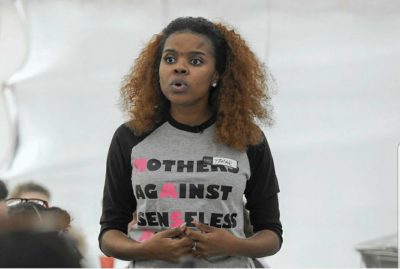In 1968 during the American Psychological Association’s national conference, a group broke off in the middle of a session to create The Association of Black Psychologists. They wanted to create a platform to actively address the needs of Black psychologists and the broader Black community. Soon after, a group formed the Chicago chapter.

Panelists included members of The Association of Black Psychologists and the Chicago Association of Black Social Workers. Donell Barnett, President-Elect of The Association of Black Psychologists, acknowledged the elders for guiding the organization through 52 years of mental health, prevention, advocacy, and civil rights work.
The Chicago Association of Black Social Workers is working on responding to community violence by closely examining the pandemic’s impact. Some of their other work involves addressing the adverse effects of remote learning due to lack of resources and assessing mental health needs.
Guest speakers included Illinois State Representative Lashawn K. Ford; Ayesha Jaco, Executive Director of Westside United; Tamar Manasseh, Founder and Executive Director of Mothers Against Senseless Killings; and Kamm Howard, National Co-Chair of the National Coalition of Blacks for Reparations in America. They offered unique insights into emotional, mental, and spiritual well being and showed how their work in therapy and community interventions complements mental health professionals.
Tamar Manasseh transformed her organization into a school in response to the pandemic so essential workers’ children would not have to stay home alone. This situation presented an opportunity for academic assessment. “Kids are failing,” said Manasseh. She recognizes the correlation between inadequate education and the culture of violence and would like psychologists to provide in-school therapy.

Ayesha Jaco’s organization works with hospitals and other organizations that have played a historical role in the disinvestment and disparity in westside communities to restore these neighborhoods through investment. Her organization focuses on racial and health equity to help Black communities impacted by the pandemic and provides grants to other organizations through partnerships. Considering the implications of the pandemic, these communities need healers to be on-site. Jaco also uses the arts to empower youth. To connect with young people and encourage them to participate in unfamiliar activities in virtual spaces, Jaco suggests choosing the right messenger and making the message cool and relatable.
Kamm Howard’s organization uses the reparations movement to address peoplehood, economic development, education, corporal punishment, and health. He would like to push forward the agenda of Chicago’s Reparations Subcommittee, part of the Health and Human Relations Committee. He also created guidelines for local reparations with three purposes: establish a triage, propel HR40, the Commission to Study and Develop Reparation Proposals for African-Americans Act, and put community structures in place to receive reparations. Howard pointed out that Black people are under constant attack, and standard models for dealing with trauma do not apply. He wants to bring back coping mechanisms such as cohesive communities, social affiliations, and artistic expression. Dr. Obari Cartman asked what else healers can do to help this movement along. Howard mentioned a study that shows a high rate of disease in Holocaust survivors as evidence of transgenerational transmission of physical trauma. He also called attention to the connection between premature aging in Black people and the social attacks we have experienced. He said that we need researchers to determine how to mitigate the damage to our DNA that appears in high disease levels.
When asked to share specific ways that healers can reduce the harm and repair the damage of intergenerational trauma beyond coping, panelists offered the following:
- Commit to being consistent.
- Fight to remove violent, vulgar music causing psychological damage from the airwaves.
- Provide tuition-free education to create more mental health professionals.
- Offer informal training in dealing with mental health issues.
- Provide re-entry coaches, resources, and healing space for families after incarceration.
- Partner with urban planners to increase program participation and conduct hip-hop healing circles.
Dr. Obari Cartman ended by stating, “There’s so much work to do and so many resources to do it all.” He advised the group to stay in tune, consistent and encouraged.
To learn more about the Chicago Association of Black Psychologists community partnership, contact them at chicagochapter.abpsi@gmail.com. You can also find them on Instagram @ChicagoBlackPsychologists, Facebook @ABPsi Chicago, and Youtube https://www.youtube.com/watch?v=lEuVpVHmLHk.
Donna Montgomery is a Community Affairs and Arts Writer in Chicago. Find her on social media @GoldenLadyWrites.
